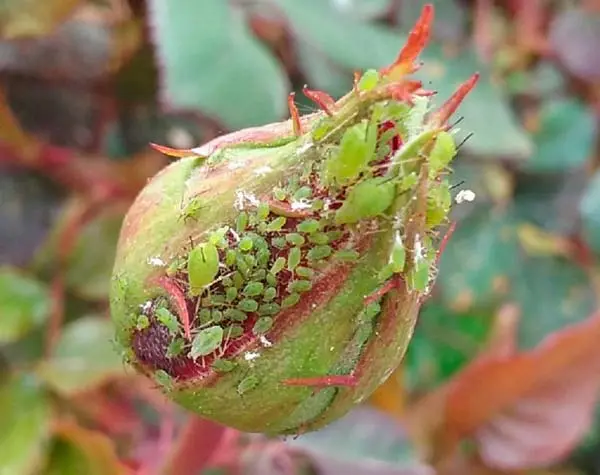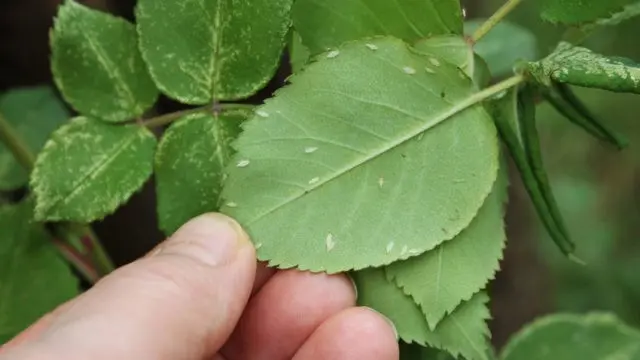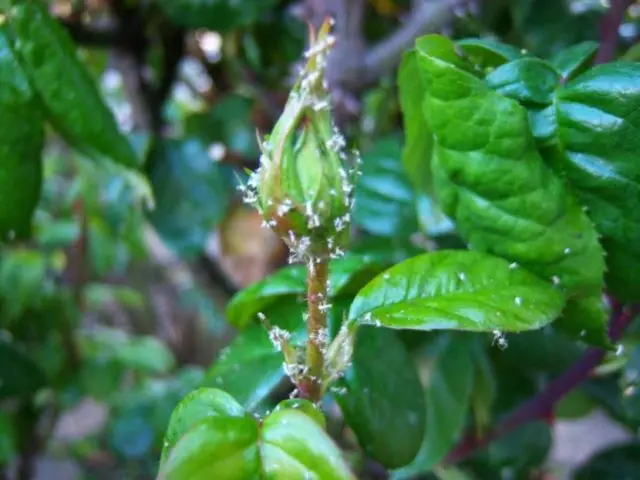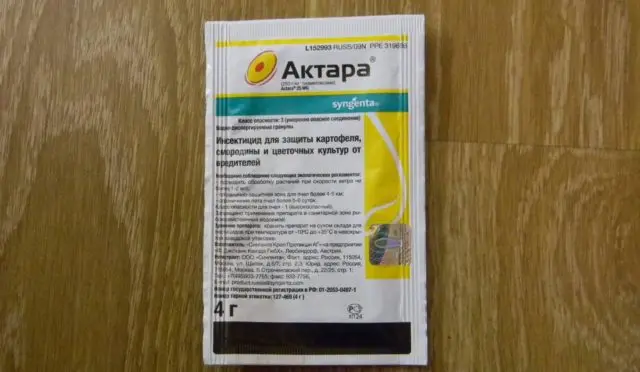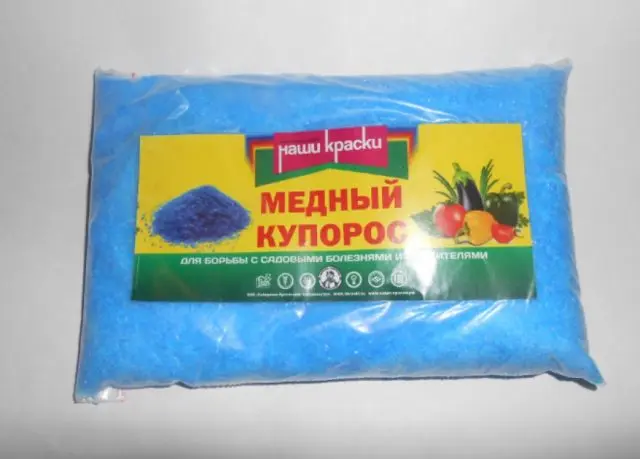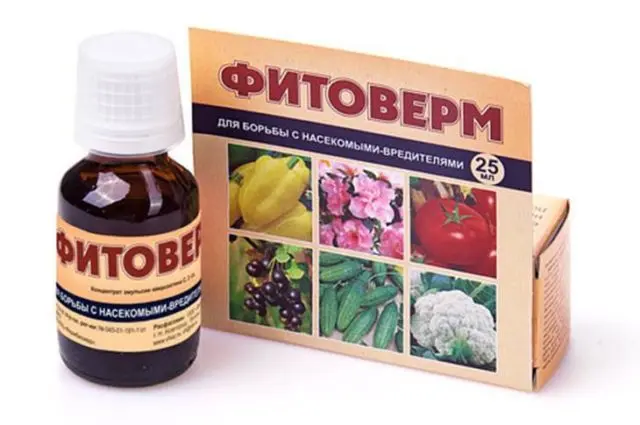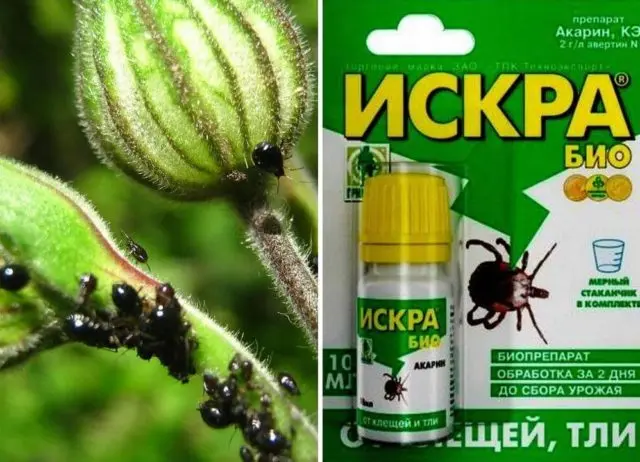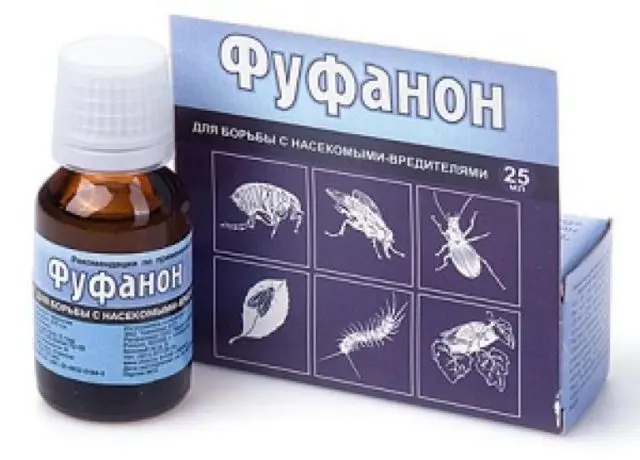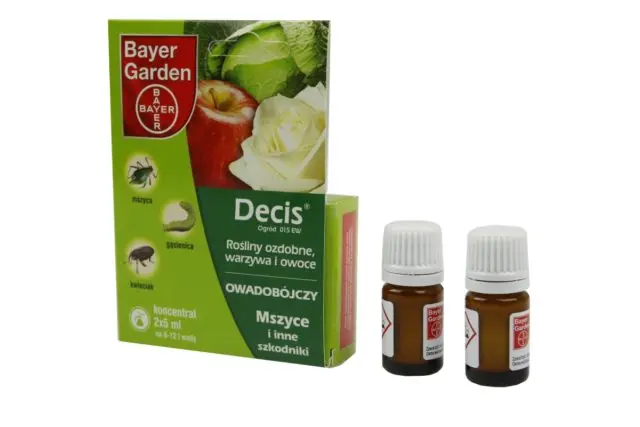Contents
- How to tell if an aphid has attacked a rose
- Methods for dealing with aphids on roses
- How and how to treat roses from aphids with folk remedies
- How to get rid of aphids on roses with Coca-Cola
- How to spray roses from aphids with ammonia
- How to remove aphids from a rose with celandine
- How does soda help against aphids on roses
- How to poison aphids on roses with kerosene
- How to spray roses from aphids with nicotinic acid
- How to spray roses from aphids with soapy water
- How to deal with green aphids on roses with vinegar
- How to save roses from aphids with other folk remedies
- Chemical preparations for aphids on roses
- Mechanical methods of dealing with aphids on roses
- How to protect roses from aphids
- Conclusion
You can process aphids on roses by several methods that differ in efficiency, safety, and active ingredient. A set of timely, regular pest control actions will help to achieve stable flowering, active growth and health of garden or greenhouse flowers.
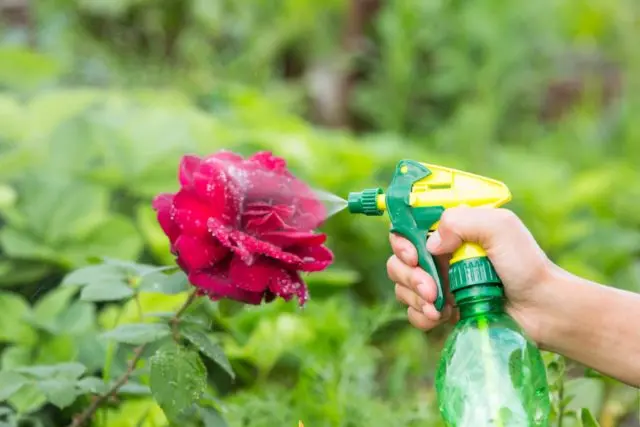
How to tell if an aphid has attacked a rose
Aphids are small parasites that suck the juice from young shoots. The insect is most active in dry, arid weather. Its breeding season falls on May-beginning of June, July, end of August. If the plants are not treated, several generations of the pest will gather in the colony during the season.
In the process of life, aphids secrete a sticky substance – honeydew, which has a sweetish taste and attracts ants. Insects live in close symbiosis. The appearance of an anthill on the site indirectly indicates the growth of the colony.
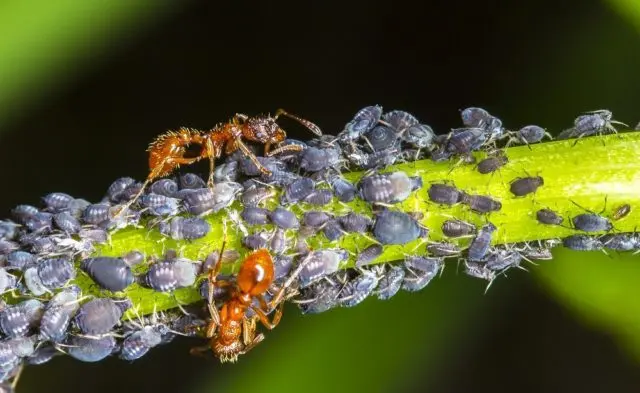
In addition, ants often carry aphids from one infected plant to another.
At an early stage, it is not easy to detect that flowers are infested with insects. The pest hides for a long time on the reverse side of the lower leaves. As the colony grows, damage becomes noticeable.
In the early stages of infestation, aphids are almost invisible on roses. The photo shows how small these parasites are.
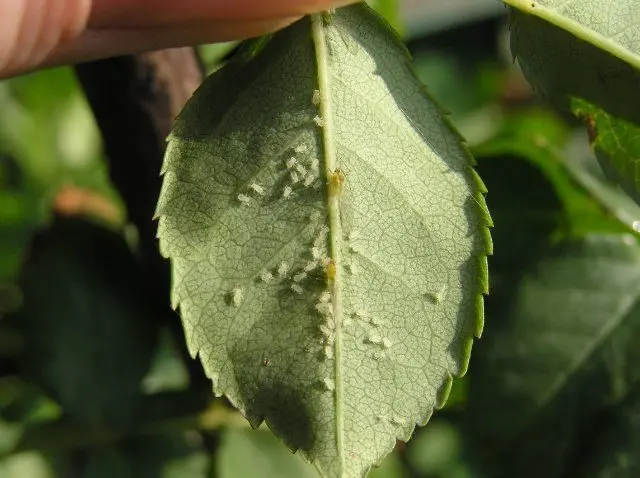
Regular inspection of rose bushes will help to notice the signs indicating the presence of aphids in time:
- The leaves lose their luster, look dull, dusty, and become sticky. They have small yellow spots.
- The buds are weakly formed, quickly crumble.
- Young shoots slow down growth, wither, deform; leaf plates are twisted.
The following types of aphids attack the rose:
- green – has an elongated, oval body and brown antennae;

- white – a small translucent parasite that often affects indoor flowers;

- mealy – typical for roses growing in greenhouses: it looks like white, but has a slight coating on the body.

White and mealy are more difficult to find, due to their miniature size (up to 1 mm) and translucent color.
When choosing chemicals or a folk remedy for aphids on roses, the type of parasite can be ignored. Any substances will be effective if the pest is detected in a timely manner and the bushes are treated. It is important to have time to spray the plants when the insects have just appeared. Females quickly begin to lay eggs (up to 20 thousand in one clutch), which the drugs have no effect on.
Methods for dealing with aphids on roses
Conventionally, methods for eliminating pests from flowers can be divided into 3 groups:
- Treatment of roses from aphids and diseases with chemicals. Insecticides quickly remove parasites, but are harmful to humans or animals.
- Folk remedies. Safe, environmentally friendly, affordable, but less effective. You will have to process the plants several times.
- Mechanical removal of aphids: manual collection of the colony, removal of infected shoots, daily washing of rose bushes. Such methods require a lot of time and do not always give the desired result.
With the active growth of the colony, it is better to use an integrated approach.
How and how to treat roses from aphids with folk remedies
Home formulations are safe for plants, animals, humans. With regular, timely use, they effectively remove aphids and ants from roses without harming the buds.
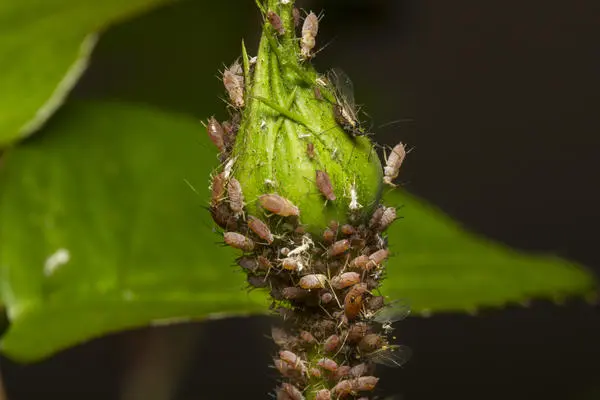
How to get rid of aphids on roses with Coca-Cola
Carbonated drinks have a powerful insecticidal effect. To remove insects:
- In a bottle of Coca-Cola (1 liter) add 50 – 60 ml of liquid laundry soap.
- Shake well.
- Pour into a spray bottle, carefully process the leaves, buds, stems so that the liquid does not fall on the ground.
- Repeat the procedure after 14 days.
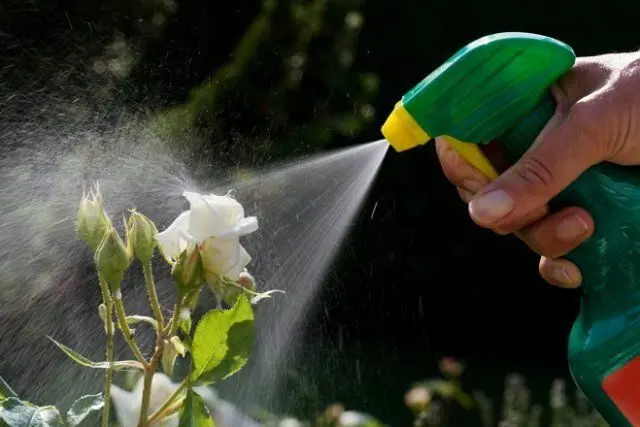
How to spray roses from aphids with ammonia
Ammonia from aphids on roses is used during dormancy, active growth, bud formation or flowering.
For spraying, a solution is prepared, which includes:
- 130 – 150 ml of alcohol;
- 1 L of water.
The resulting tool needs to be treated with damaged shoots 1 time in 5 – 7 days, until the parasites are completely destroyed.
How to remove aphids from a rose with celandine
Infusion of celandine quickly and effectively fights insects. To destroy aphids, you must:
- 200 g of grass leaves pour 0,5 liters of water.
- After a day, boil for 30 minutes.
- Cool, strain, pour into a spray bottle.
- Spray the leaves thoroughly on all sides.
The procedure is repeated no more than once a week. Each time, a fresh infusion is prepared.
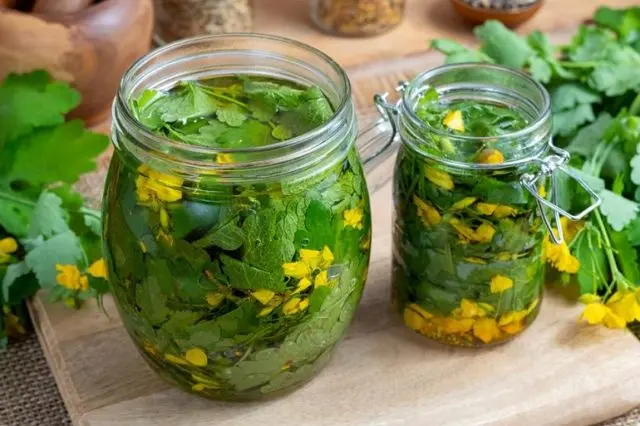
How does soda help against aphids on roses
Soda for washing rose bushes is used as a solution:
- Dissolve 1 tsp in 2 liter of water. powder.
- Infected shoots are dipped into the resulting composition, left for 15 – 20 minutes.
- The procedure is repeated every 3 to 5 days until the aphid dies.
How to poison aphids on roses with kerosene
Kerosene is used until the buds open. To treat roses from insects, perform the following manipulations in sequence:
- A solution is prepared from 10 l of settled water and 3 ml of the substance.
- Add a handful of soap chips.
- Rose bushes are carefully treated with the resulting adhesive composition.
- A day later, the plant is watered abundantly, its leaves and shoots are washed from a watering can.
Kerosene effectively destroys aphids, and also repels ants.
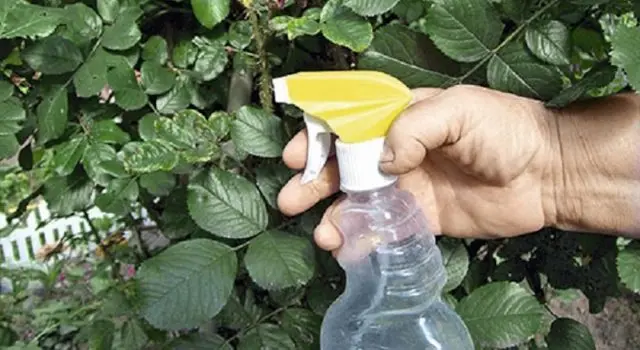
How to spray roses from aphids with nicotinic acid
One of the quick methods of saving roses from aphids is to water the bushes with a solution of nicotinic acid. The composition of the tool includes:
- 2,5 L of water;
- 1 tablet of nicotinic acid.
The resulting solution is sprayed with infected branches.
Nicotinic acid is also effective against caterpillars, mites and other pests.
How to spray roses from aphids with soapy water
Laundry soap is recognized as the best remedy for aphids on roses. The solution is used in pure form or in combination with other ingredients (soda, kerosene).
For daily processing, a composition is prepared, including:
- 2 L of water;
- 40 – 50 g of grated soap or 3 – 5 tbsp. l. liquid.
Roses are treated daily for 2 weeks. After this period, the aphid will disappear.
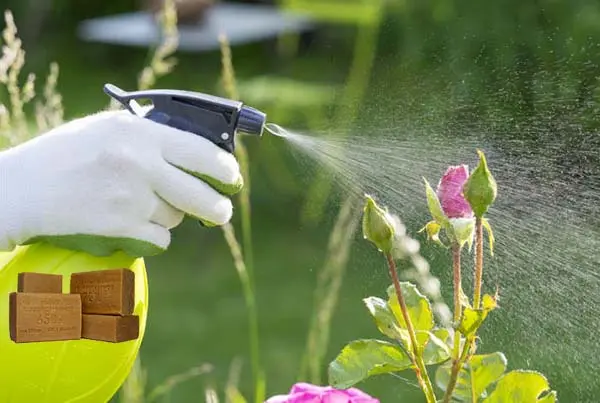
How to deal with green aphids on roses with vinegar
Vinegar has a strong effect, but can damage tender young shoots, buds. To process roses, bred:
- 1 st. l. essences;
- in 5 liters of water.
The resulting composition is watered with bushes or sprayed with individual infected branches.
How to save roses from aphids with other folk remedies
Infusions, decoctions, herbal extracts are not chemical preparations. However, if the calculation is incorrect, the permissible concentration is exceeded, or they are used too often, they can:
- cause leaf scorch;
- become poisonous to insect pollinators;
- cause irritation, allergic reactions in humans.
The most successful and safe, according to experienced flower growers, are the following compositions.
Onion
To treat rose bushes from aphids with this remedy, take:
- 1 – 2 large onions or 3 handfuls of husks;
- 1 L of water;
- ¼ grated bar of laundry soap.
The ingredients are mixed, infused for 5-7 hours, filtered. Spray the flowers in the evening, after which they do not water for 2 days.
Tobacco
Tobacco repels aphids, ants, and other pests. To prepare the infusion you will need:
- 1 st. dry leaves;
- 5 L of water.
The solution is left for 2 days, filtered, water is added to 10 liters.
Citrus
A decoction based on lemon or orange peels will help to quickly remove white aphids on a rose. It consists of:
- 300 – 350 g of citrus zest or chopped skins;
- 1 liter of boiling water.
The composition is insisted for three days in a dark, warm place, filtered. The resulting product is washed with roses 2 – 3 times a week.
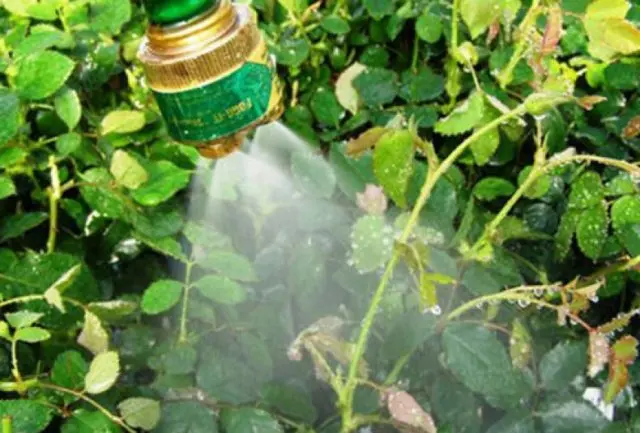
Chamomile.
Chamomile has strong insecticidal, disinfecting properties. To prepare the infusion take:
- 1 st. dry flowers;
- 2 L of water.
Insist 12 hours.
To treat roses from green aphids, the concentrated composition is diluted with water in a ratio of 1: 3. Wash the leaves, buds and shoots of the plant every other day for a week.
Marigold
Marigolds are planted near fruit trees, cucumber beds, next to flower beds. With their aroma, they scare away ants – peddlers of aphids. To enhance the effect of roses, you can spray with an infusion, including:
- 200 g crushed flowers;
- 2 L of water.
The composition is infused for 24 hours, filtered, 50 g of soap chips are added.
Garlic
Garlic infusion is prepared in 3 hours. This allows it to be used as an express remedy when immediate action is needed to save the rose from aphids.
The composition of the tool includes:
- 10 g minced garlic cloves;
- 3 liter of cool water.
After 3-4 hours, the infusion is filtered, diluted with fresh water (1: 1), the infected branches are thoroughly washed.
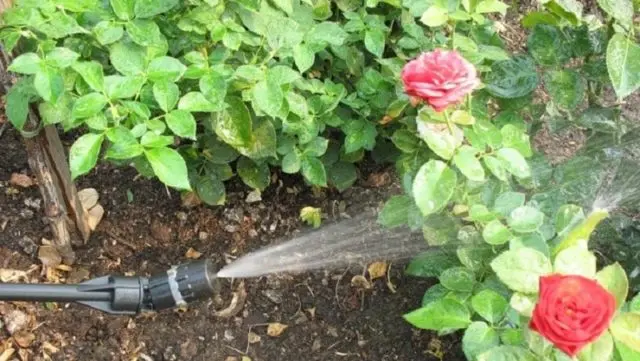
To properly process roses from aphids, it is important to follow the recommendations:
- First you need to spray a small area, check the reaction of the plant to the selected composition. If there are no negative consequences, the flower bed can be washed completely.
- If you intend to use the petals for cosmetic or gastronomic purposes, processing should be carried out at least 2 weeks before harvest.
- You can water roses from aphids with infusions or decoctions only on a cool, cloudy, but not rainy, day. It is advisable to choose the morning or evening time for the procedure.
In addition, to achieve the best effect, it is worth washing off the pests for several days in a row. If after 3-5 days the result is not noticeable, it is worth treating the branches with a different composition or using chemistry.
Chemical preparations for aphids on roses
Folk methods that allow you to process flowers from aphids are not always effective. In advanced cases, only industrial insecticides will help get rid of pests.
The names of preparations for aphids on roses are known to all gardeners and gardeners, since they are used for spraying fruit and vegetable crops. The most popular of them:
- Aktara – a fast-acting insecticide. Refers to drugs of the 3rd degree of danger, work with it is allowed only with gloves. The packaging must be diluted in 5 liters of clean water, the roses should be carefully processed. Particular attention should be paid to the underside of the leaf plate and petals.

- Copper sulfate (combined with urea) – suitable for early spraying of bushes in spring. To apply 1 tbsp. l. the drug must be dissolved in 5 liters of water, add 300 g of urea, spray the flowers.

- “Fitoverm” – safe for flowering plants in open or protected ground.

- Iskra Bio – an aphid paralyzing substance based on natural components. The activity of pests after processing falls, they become easy prey for caterpillars, ladybugs.

- Fufanon – an insecticide of complex action, which is effective against ticks, ants, aphids. The protective properties of the drug remain up to 14 days after spraying.

- “decis” – the best remedy for aphids on garden or greenhouse roses. Belongs to the category of substances of contact-intestinal action. The drug is non-toxic, in small (recommended) doses it is safe for humans, animals, pollinating insects.

To properly treat roses from aphids with insecticides, you must first study the manufacturer’s recommendations. Sometimes one spray is not enough. Depending on how the substance works, it may need to be reapplied.
Cons of using chemicals
It is worth resorting to industrial insecticides only after folk methods and mechanical removal of insects have not helped.
Chemicals:
- dangerous for garden crops growing nearby;
- make it impossible to use rose petals in cooking or home cosmetology;
- lose effectiveness over time, as aphids quickly develop immunity.
Experienced gardeners recommend alternating insecticides with eco-friendly home remedies, periodically inspecting the bushes, and strictly observing the dosage.
Mechanical methods of dealing with aphids on roses
This small insect feeds on plant sap, attaching its proboscis to stems and leaves. Because of this, it is impossible to lure aphids into a trap.
In addition to the use of chemicals and improvised household products, gardeners use the following pest control options:
- collection of the colony by hand;
- removal of heavily affected shoots along with aphids;
- washing rose bushes with running water from a hose or watering can (several procedures are required);
- cleansing the root space from weeds, small shoots.
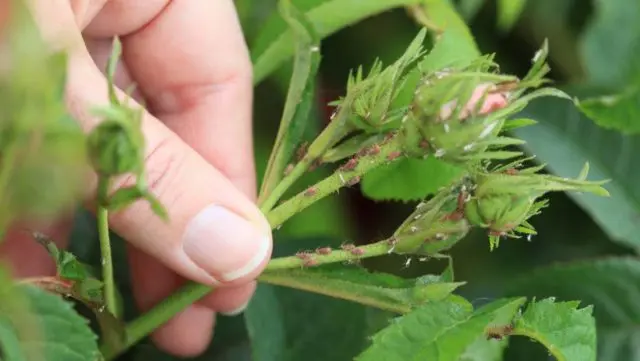
The best results are obtained by an integrated approach. If you wash off the aphids from the rose, but do not remove the weeds, the insects will quickly return to their positions on the buds.
How to protect roses from aphids
The appearance of parasites on roses can be avoided with proper care, comprehensive measures to protect the site, and regular inspection of plants.
Prevention methods include:
- timely removal of dried shoots, buds, leaves;
- timely weeding under rose bushes;
- early spring treatment with insecticides;
- high-quality watering, regular fertilization to maintain the immunity of flowers;
- ant control in the area.
If, at the first signs of infection, you spray roses from aphids with affordable folk remedies, you will not need to use chemicals.
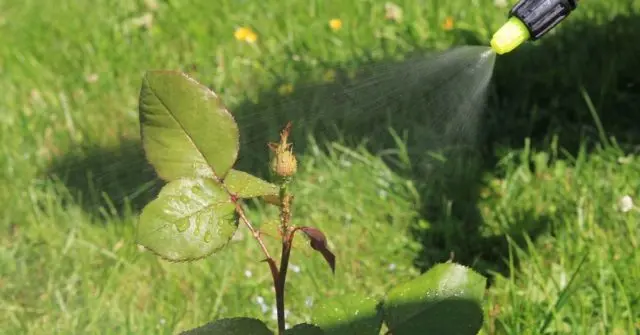
Compliance with the general principles of agricultural technology and careful attention to plantings will help to avoid abundant reproduction of insects.
Conclusion
You can treat aphids on roses with folk methods or chemicals. The best result is obtained by an integrated approach, including regular inspection of the bushes, preventive spraying of them with non-toxic improvised means (for example, soda), and the timely use of insecticides. Maintaining the cleanliness of the site, removing weeds, and killing ants helps to fix the result.










